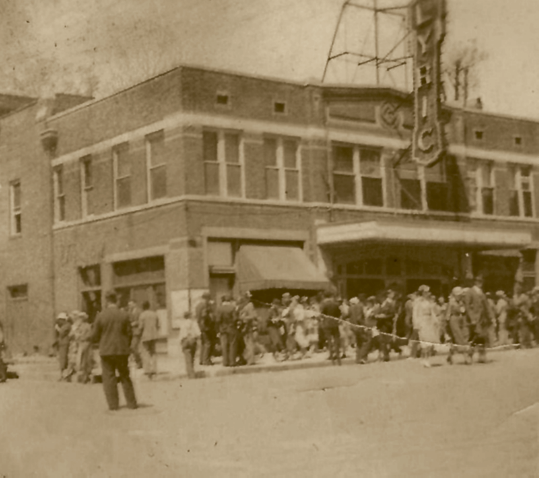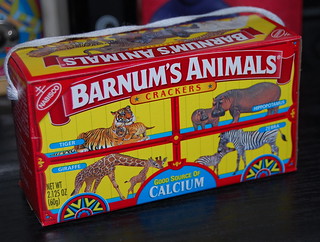 When Mother was a little girl in Tupelo, Mississippi, the local theater, converted from its original use as an opera house, was named The Strand. I don’t know how old she was when she started going to movies there with her brother Gerald, but she remembered that the two of them could see a Saturday matinee for a nickel. They’d get their money from their father or an older sibling (they were the two youngest of twelve), and spend the afternoon transported to other lives, other places.
When Mother was a little girl in Tupelo, Mississippi, the local theater, converted from its original use as an opera house, was named The Strand. I don’t know how old she was when she started going to movies there with her brother Gerald, but she remembered that the two of them could see a Saturday matinee for a nickel. They’d get their money from their father or an older sibling (they were the two youngest of twelve), and spend the afternoon transported to other lives, other places.
By the Depression years, the theater had been bought by a regional company and renamed The Lyric. As my mother recalled, her father and older brothers worked during those years, plus they grew so much of their own food, that they weren’t as impacted by poverty as many others were. They were certainly poor, but they weren’t hungry, and there were still nickels available so they could escape the grimmer realities of the time by walking through the doors of The Lyric. For her nickel, she’d get a newsreel, a cartoon, and at least one, sometimes two, features.

It’s easy to see that the era’s musical films and comedies provided escapism. Certainly the lives of the affluent were portrayed. But there was also a theme running through them: the belief that a person, no matter the circumstances, could get through hard times. A blend of luck, hard work, and right behavior: These might not make you wealthy, but they could help you make a good life. Hope was important to adults and children of the 1930s, and Mother’s favorite movies exemplifying that theme were those starring Shirley Temple. To her, Shirley Temple was a shining example of all that could be good and funny and creative in a girl.
 One thing she wanted and couldn’t have was a Shirley Temple doll. She always said it was probably for the best, since it undoubtedly would have come to great harm at the hands of her rambunctious brothers. As the economy began improving for most Americans, Mother’s family experienced misfortune. Her mother became bedridden. Her father’s work situation changed. By the time she was barely into her teens, she had to leave school and become a caregiver to anyone who was sick or to newborn and toddler nieces and nephews.
One thing she wanted and couldn’t have was a Shirley Temple doll. She always said it was probably for the best, since it undoubtedly would have come to great harm at the hands of her rambunctious brothers. As the economy began improving for most Americans, Mother’s family experienced misfortune. Her mother became bedridden. Her father’s work situation changed. By the time she was barely into her teens, she had to leave school and become a caregiver to anyone who was sick or to newborn and toddler nieces and nephews.
Mother did eventually, with my father, use those values she learned as a child to build a good life. From the time I reached about the age she was when she had to leave school, I became her movie watching partner. We’d stay up late on weekends to see old movies, or spend Saturday mornings and Sunday afternoons watching, on TV, all the films that she’d loved in childhood. We both preferred screwball comedies, and I also loved Shirley Temple along with her.
The Lyric still exists today, restored, preserved, and used for live community theater. And though Mother and I often found Shirley Temple dolls when we’d go antiquing, the thrift she’d learned by living through the Depression was too entrenched in her. She would never have paid the collector prices for a doll in good condition. And she’d have been furious with me if I had bought one to give her.
After all her kids were gone, and after my father died, she bought her first VCR. The first VHS tapes she purchased were Shirley Temple movies. Up until she died, we’d still turn on the TV and find old movies to enjoy together. In fact, the day she died, we had an old Western playing with the sound off in her hospice room. David, Debby, Lynne, Tom and I cracked ourselves up as we invented crazy dialogue for it. I’ll always be glad that whatever awareness she had in those hours included the sounds of her children laughing.
Two years younger than my mother, Shirley Temple outlived her by almost six years. As Shirley Temple Black, she had an amazing life. Rather than trying to hold on to a career that began to fade after her childhood years, she retired from films. She sometimes worked in television. She married and had children. She was politically active. A lifelong Republican, she once ran for office and lost. She was appointed Representative to the Twenty-fourth U.N. General Assembly by President Nixon and U.S. Ambassador to Ghana by President Ford. As the first female Chief of Protocol of the U.S. from 1976 to 1977, she was in charge of arranging President Carter’s inauguration and inaugural ball. Her last official position was as U.S. Ambassador to Czechoslovakia from 1989 to 1992, appointed by President George H. W. Bush.
And thanks to the movies, she will always be that bubbly child of the 1930s. Growing up, my favorite Shirley Temple movie was The Littlest Rebel, but really, I liked them all. More than anything in the world, I wish I could curl up once more in the den with my mother–both of us drinking iced tea, maybe sharing a bowl of popcorn, laughing and shedding a few sentimental tears over whatever hardships Shirley’s character has to face and whatever happy ending is in store for her. Since I can’t do that, I am going to watch the movie I seem to recall was my mother’s favorite, Curly Top. And I’ll probably eat a few of these as I sing along.
 Once Mother said My little pet
Once Mother said My little pet
You ought to learn your alphabet
So in my soup I used to get
All the letters of the alphabet
I learned them all from A to Z
And now my mother’s giving me
Animal crackers in my soup
Monkeys and rabbits loop the loop
Gosh oh gee but I have fun
Swallowing animals one by one
When they’re inside me where it’s dark
I walk around like Noah’s Ark
I stuff my tummy like a goop
With animal crackers in my soup
Lyrics to “Animal Crackers in My Soup” from the movie Curly Top by T.Koehler & I.Caesar/R.Henderson.

what a lovely tribute to two wonderful women who led by example
Thank you, Marika. =)
I miss Dorothy every day. I miss her stories, her hugs and her love. But I am comforted by the picture of her that I have in mind from the last time I saw her. Dorothy in bed with Aaron laying next to her, her arm around him. I believe they are together now and she still has her arms around him.
She’s probably also telling him all the details I’m getting wrong in these family stories I tell!
Lots of love between those two, for sure. I was always so grateful to you, Aaron, and Alex for the time you shared with her when she moved back to Texas.
Thanks for sharing. People in the 30s were lucky. They had Shirley’s innocence. All we’ve got today is Honey Booboo.
Celebrity–and celebrity worship–is a freakish animal. It takes enormous effort for it to be managed with dignity. Apparently this is especially true when children are regarded as the gravy train.
I don’t think I have ever seen a Shirley Temple film.
You have made me want to watch a film with Chris, though.
Then cuddle up on the couch with Chris and the dogs and enjoy!